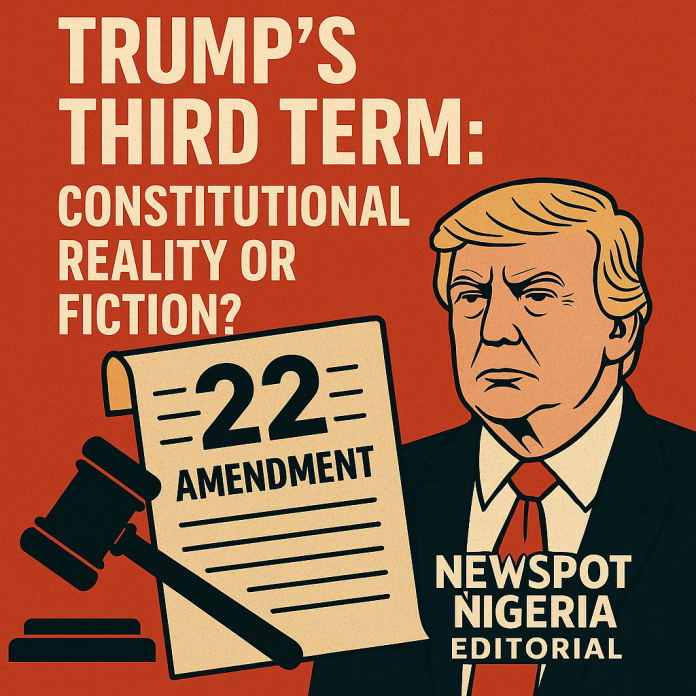The prospect of Donald Trump seeking a third term has ignited intense debate across the United States and beyond. For some, it’s a mere fantasy, while others see it as a potential reality achievable through unconventional legal interpretations or constitutional amendments. For the first time, Newspot Nigeria takes a deep dive into the constitutional framework governing U.S. presidential term limits, weighing the arguments for and against the possibility of a third Trump term.
The Constitutional Boundary: The 22nd Amendment
The 22nd Amendment to the U.S. Constitution, ratified in 1951, sets a clear and firm limit on presidential terms. It states:
“No person shall be elected to the office of the President more than twice, and no person who has held the office of President… for more than two years of a term to which some other person was elected President shall be elected to the office of President more than once.”
This amendment was a direct response to President Franklin D. Roosevelt’s unprecedented four terms, which raised concerns about prolonged executive power and the erosion of democratic checks and balances. The amendment effectively capped presidential service at two terms to safeguard against any individual entrenching themselves in the nation’s highest office.
Under this provision, Trump’s re-election for a third term is constitutionally prohibited. However, some of his supporters, citing historical precedents and possible loopholes, argue that a third term is not entirely off the table.
The Case for a Third Term: Legal Maneuvering and Popular Mandate
Trump’s advocates have floated various scenarios to argue that he could potentially run again. These include:
1. Constitutional Amendment: The Long Shot
The most straightforward, though highly improbable, route would be amending the Constitution. Article V outlines this process:
-
Approval by two-thirds of both the House of Representatives and the Senate.
-
Ratification by three-fourths of state legislatures or state conventions.
Given the deeply polarized political climate, securing such overwhelming support for an amendment is a near-impossible feat.
2. Vice Presidential Gambit: A Legal Grey Zone
Another theory suggests that Trump could run as Vice President and, upon the resignation or removal of the sitting president, ascend to the presidency. While the 12th Amendment does not explicitly bar a former president from serving as vice president, the 22nd Amendment’s restriction on being “elected” to the presidency more than twice would likely prevent Trump from legally reclaiming the presidency through this route.
3. Declaration of National Emergency: A Dangerous Precedent
A more extreme and legally dubious scenario involves invoking a national emergency or martial law to justify an extended stay in office. Such a move would undoubtedly face immediate judicial challenges and provoke widespread public outcry. Even with a conservative majority, the U.S. Supreme Court is unlikely to uphold a maneuver that blatantly undermines the Constitution.
Judicial Scrutiny: The Supreme Court as the Ultimate Arbiter
If Trump were to attempt to extend his presidency beyond constitutional limits, the U.S. Supreme Court would play a decisive role. Historically, the Court has upheld the sanctity of term limits and reinforced constitutional checks on executive power. While Trump appointed three conservative justices during his tenure, the Court is unlikely to endorse any attempt to overturn established constitutional norms.
Arguments Against a Third Term: Protecting Democratic Norms
Opponents of a third term argue that allowing Trump—or any president—to serve beyond two terms would erode the core principles of American democracy. The 22nd Amendment was explicitly designed to prevent the emergence of a quasi-monarchical presidency. Prolonging a president’s tenure risks concentrating power in a single individual, undermining the democratic principle of peaceful transitions of power.
Furthermore, attempts to circumvent constitutional limits would set a dangerous precedent for future presidents, opening the door to authoritarian tendencies and weakening America’s democratic institutions.
Lessons from Other Nations: A Cautionary Tale
Countries like Russia and China have extended presidential terms through constitutional changes, allowing leaders to remain in power indefinitely. While such moves may provide short-term political stability, they often come at the cost of democratic backsliding, weakened institutions, and diminished public trust. The United States, with its long tradition of peaceful transitions of power, has so far resisted such trends.
Constitutional Guardrails Hold Firm
Despite creative legal theories and political maneuvering, the constitutional barriers to a third Trump term remain formidable. The 22nd Amendment serves as an ironclad safeguard against the concentration of power in one individual, and any deviation from this principle would require an amendment or an extraordinary breach of constitutional norms.
Conclusion: Safeguarding Democracy or Opening Pandora’s Box?
While Trump’s supporters may view a third term as a path to restoring “greatness,” the constitutional constraints in place are designed to protect the republic from precisely this type of prolonged executive power. The Constitution’s authors, wary of unchecked authority, established firm boundaries to preserve the integrity of democratic governance.
As the 2028 election cycle approaches, the American electorate—and the nation’s legal institutions—must remain vigilant in upholding these constitutional principles. The resilience of American democracy depends not on the ambitions of individual leaders but on the unwavering commitment of its people to protect the guardrails that have sustained the nation for over two centuries.

Share your story or advertise with us: Whatsapp: +2347068606071 Email: info@newspotng.com









 NEWSPOT NIGERIA DAILY PULSE
NEWSPOT NIGERIA DAILY PULSE  April 3, 2025
April 3, 2025






